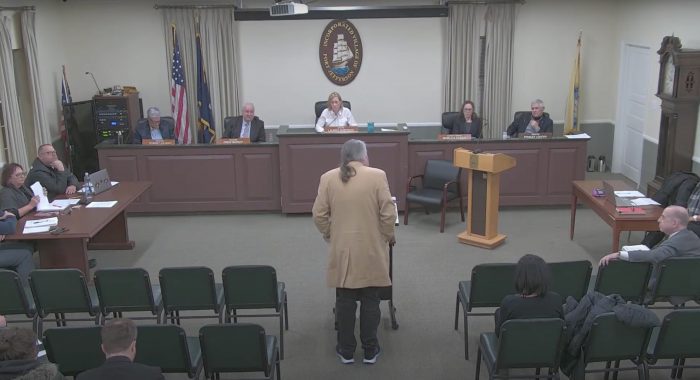Proposed ethics code sparks heated debate in Port Jefferson

By Lynn Hallarman
Village of Port Jefferson officials and residents engaged in an impassioned debate over the proposed ethics code in a contentious Board of Trustees meeting at Village Hall Jan. 31.
This meeting marked the end of the public comment period for the proposed ethics code. A vote was then held by the trustees, passing unanimously a replacement of Chapter 41 of the Code of Ethics.
Ethics code
Since the fall, the village trustees have been working toward a sweeping revision of Chapter 41, which establishes standards of ethical conduct for officers and employees of the village. The current Code of Ethics was adopted in the 1970s with few revisions since.
The purpose of the initiative is twofold: Firstly, to update the code and align the village with current standard practices employed by municipalities across the state that are in accordance with Article 18 of the New York State General Municipal Law. Secondly, to establish a board of ethics for the first time in the village’s history.
Issues covered by the proposed Code of Ethics include conflict of interest, gifts and tips, use of village resources, annual financial disclosure of certain village officers and employees, disclosure of confidential information and nepotism.
The draft of the proposed code presented to the public at the meeting included the establishment of village board of ethics. According to this draft, the ethics board would consist of five voluntary members drawn from the community who offer their names and credentials. The mayor then nominates candidates from the pool of submissions. The Board of Trustees considers the nominations for approval.
The duties of the ethics board include hearing complaints and concerns and issuing an opinion. The board is responsible for educating and training village officials and employees about the ethics code.
The village hired attorney Steven Leventhal, a recognized New York State legal ethics expert, to guide the village through drafting the village’s proposed ethics code and forming an ethics board.
Mayor Lauren Sheprow reminded the public that they can still submit their names through the “Make a difference” portal on the village website for consideration as board of ethics members. Sheprow said that nine people have submitted their names.
Public comments
Comments from the public about the proposed code were mainly about the structure of the board of ethics and how board members are nominated and approved. Some residents expressed concern about the concentration of nomination power with the mayor. Others felt community members should be able to review the credentials of the people nominated.
Tensions were evident in the comments to the board by village resident William Snaden. He is the husband of former trustee and deputy mayor Kathianne Snaden, who fell short of her bid for village mayor against Sheprow this past election cycle. Questioning the authenticity of the board’s commitment to ethics, William Snaden alleged that the push for an ethics code was a guise for a hidden agenda against the former village administration.
“Is this a genuine push for ethics? Or is it a disguise for another agenda? Or is this just a taxpayer-funded personal vendetta?” Snaden said. He added, “I hope that you join together in voting ‘no’ for this code as it’s currently written.”
Amid a cascade of accusations, Snaden questioned the ethics of hiring Leventhal, referring to a Newsday article highlighting a $1,000 fine sanctioned against Leventhal by state Supreme Court Justice James McCormack in 2017, according to Newsday.
“Mr. Snaden mentioned a couple of different issues, none of which he is acquainted with the facts,” Leventhal countered.
Leventhal disputed Snaden’s accusation, and conveyed to the board that the grievance committee examining the sanction concluded there was “no violation of the rules of professional conduct.”
Snaden pointed out that the village hired Leventhal as the ethics attorney after Sheprow employed him as the attorney for her campaign bid. Snaden alleged this action was unethical.
Former Mayor Margot Garant followed Snaden by asking why Sheprow did not disclose to the Board of Trustees her professional relationship with Leventhal at the time of his hiring by the village.
Leventhal responded, “There is no requirement in the law for the mayor to disclose that she had been represented by an attorney in an entirely unrelated matter that concluded before the village hired that same attorney as a consultant,” adding, “There is no conflict of interest.”
Sheprow explained, “I built trust that was started during the election process, and as I continued to research Mr. Leventhal’s experience, it became obvious that he is the premier expert in legal ethics in New York state.”
Village resident Arthur Epp countered Snaden’s suggestion to the board to scrap the proposed ethics code.
“I applaud this initiative. I’ve said this at a previous meeting, I’ve said it in writing. I’m saying it now. I’m more concerned about the possibilities down the road that might occur. I’m not casting stones at anyone in this room,” Epp said.
Village resident Xena Ugrinsky told the board that she had been paying close attention to the discussions about the proposed code over the past months.
“I believe that putting this in place will foster more trust in government. Mayor, I think this is one of the reasons you were elected — the people spoke, and I thank you,” Ugrinsky said.
The board closed the public comments for the proposed ethics code and then weighed the concerns voiced by the public about the nomination process. The code was revised to read:
“The Board of Ethics shall consist of five members appointed by the Village Board of Trustees,” eliminating the language in the draft that placed nominating power with the mayor.
The board then voted unanimously to pass the replacement to Chapter 41, Code of Ethics.
The Board of Trustees will hold the next work session on Wednesday, Feb. 14.






